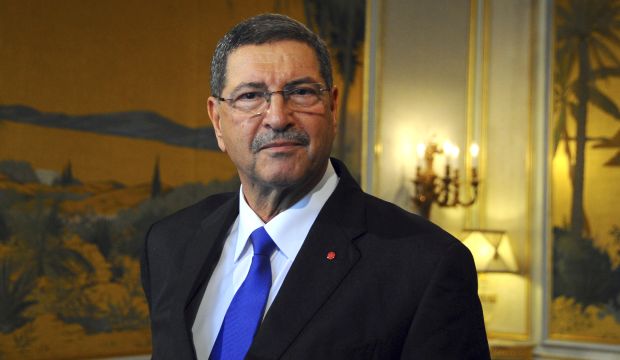
New Tunisian Prime Minister Habib Essid looks on after presenting his second government to the media in Tunis, on February 2, 2015. (AP Photo/Hassene Dridi)
Tunis, Asharq Al-Awsat—Tunisian Prime Minister-designate Habib Essid’s proposed national unity government has come under fire for its inclusion of Ennahda ministers, political sources told Asharq Al-Awsat on Monday.
The proposed cabinet, named on Monday, is the second cabinet line-up to be named by Essid, after an initial line-up that did not include Ennahda ministers was rejected last week as unrepresentative of the composition of parliament.
The new cabinet line-up includes ministers from both Nidaa Tounes and its main political rival, the Islamist Ennahda party.
Nidaa Tounes’ Selim Chaker was named finance minister, while Taïeb Baccouche, also of Nidaa Tounes, was appointed as foreign minister. Ennahda’s Ziad Ladhari was appointed as employment minister, while the Islamist party was also granted a number of other junior ministerial posts.
In his speech announcing the new cabinet lineup, Essid said: “I made some adjustments so we can gather all political forces and get to work immediately on the challenges we are facing.”
However the inclusion of Ennahda ministers has angered some of Tunisia’s liberal and secular parties.
Senior Nidda Tounes official Boujemaa Remili told Asharq Al-Awsat: “We did not get what we wanted in the new government.” He said that Nidaa Tounes is set to hold a number of high-level meetings over the coming days to discuss the proposed cabinet, and particularly Ennhada’s role in government.
“Our regional leadership are not satisfied with Ennahda’s involvement in the cabinet,” he added.
A spokesmen for the Ennahda Movement, Walid Bennani, told Asharq Al-Awsat that the Islamist party will support the Essid government because the prime minister-designate had responded to the party’s terms regarding the formation of a national unity government.
“We are going to vote for this government. It is representative,” the Ennahda MP said.
Imed Daimi, head of the Congress for the Republic party, told Asharq Al-Awsat that his party, which won four parliamentary seats, will not vote in favor of the new cabinet.
“This government is incapable of carrying out radical economic and social reforms,” he said.
Daimi criticized the Essid government as being “fragile and erratic,” adding that even if it manages to secure enough votes, it would soon fracture and split.
Essid needs to secure 109 “yes” votes from Tunisia’s 217-seat parliament. Nidaa Tounes holds 86 seats and is allied to the liberal, secular Union pour la Tunisie, which holds 16 seats. Ennahda hold 69 seats, which means that the prime minister-designate should easily be able to get his proposed government ratified with the backing of the Islamist party.
